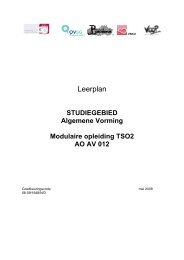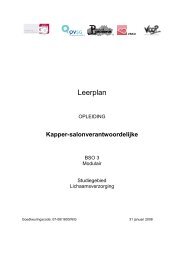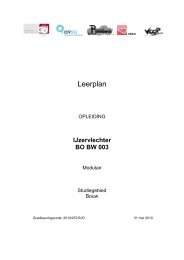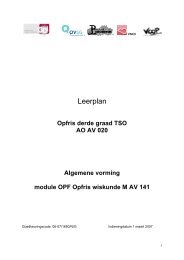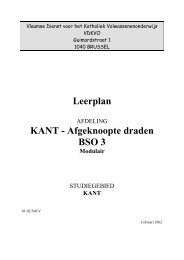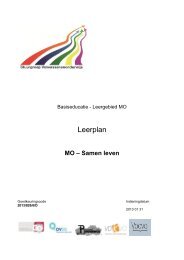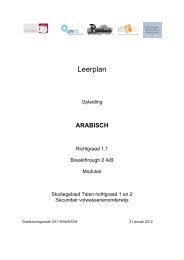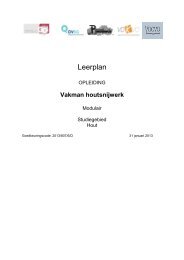Opfris derde graad ASO - Stuurgroep Volwassenenonderwijs
Opfris derde graad ASO - Stuurgroep Volwassenenonderwijs
Opfris derde graad ASO - Stuurgroep Volwassenenonderwijs
Create successful ePaper yourself
Turn your PDF publications into a flip-book with our unique Google optimized e-Paper software.
Voorbeeld 4<br />
De volgende, subjectievere, evaluatieschaal werd ontworpen door Carrol 5<br />
INTERVIEW SCALE<br />
Schrijfvaardigheid<br />
9 EXPERT SPEAKER. Speaks and interacts authoritatively. Completely competent in topics<br />
discussed. May have a very slight non-native accent.<br />
8 VERY GOOD SPEAKER. Virtual complete mastery of language, able to keep up own side<br />
of dialogue very well. Mother tongue accent and usage will occasionally be<br />
noticeable.<br />
7 GOOD SPEAKER. Makes a positive contribution to the dialogue, using main strategies of<br />
effective interaction and can cover some lack of complete language mastery. Some<br />
hesitations and circumlocutions, but no real blockage in communication. Fairly<br />
obijv.ious non-native accent, but no real unintelligibility.<br />
6 COMPETENT SPEAKER. Interacts effectively on the whole, but with noticeable<br />
hesitations, repetitions and circumlocutions and some errors and inappropriacies.<br />
Obijv.ious non-native accent, but still communicates with reasonable impact and<br />
interest.<br />
5 MODEST SPEAKER. Can answer questions and explain main points in a topic, but<br />
requires a degree of tolerance from interviewer and errors, and inappropriacies<br />
impede communication. Usually gets the gist of the discussion and can be quite<br />
interesting at times.<br />
4 MARGINAL SPEAKER. Although in touch with topics discussed, is very dependent on<br />
interviewer in the interaction. A considerable number of inaccuracies and<br />
inappropriacies. At times, accent impedes understanding. Major misunderstandings<br />
can be eventually cleared up. The interview is not a rewarding experience. Strong<br />
accent. Requires tolerance from interviewer.<br />
3 EXTREMELY LIMITED SPEAKER. Level of interaction just about as low a level as possible<br />
to be real communication. Many questions have to be repeated or rephrased and<br />
some responses not immediately intelligible. Does not develop points or use<br />
information-getting strategies. Too many misunderstandings for comfort. Very strong<br />
accent. Given help, communicates basically.<br />
2 INTERMITTENT SPEAKER. Only partial and intermittent contribution to dialogue. Most<br />
questions have to be repeated, and the replies teased out. Can carry out very simple<br />
communicative tasks.<br />
1/0 NON-SPEAKER. Either has one or two routine phraes or does not know which language<br />
is being used.<br />
1. Toetsvormen<br />
Net zoals bij spreekvaardigheid is het objectief evalueren van de schrijfvaardigheid moeilijk. Volgende toetsvormen<br />
zijn mogelijk:<br />
1.1. kopieertoetsen<br />
1.2. dictees (bijv.: klankdictees, tekstdictee, woorddictee...)<br />
1.3. geleid schrijven<br />
zinsvorming a.d.h.v. een aantal opgegeven woorden<br />
tekstvorming a.d.h.v. een aantal opgegeven woorden<br />
zinnen afmaken<br />
een ontbrekend (weggeknipt) zijdeel van een tekst aanvullen<br />
vragen over een tekst laten beantwoorden<br />
5<br />
Uit: - Make your own language tests: A practical guide to writing language performance tests / Brendan J. Carroll;<br />
Patrick J. Hall.- Oxford: Pergamon, 1985.- 172 p.-<br />
Leerplan Algemene Vorming – <strong>Opfris</strong> Derde Graad <strong>ASO</strong> 2007-03-01<br />
89




